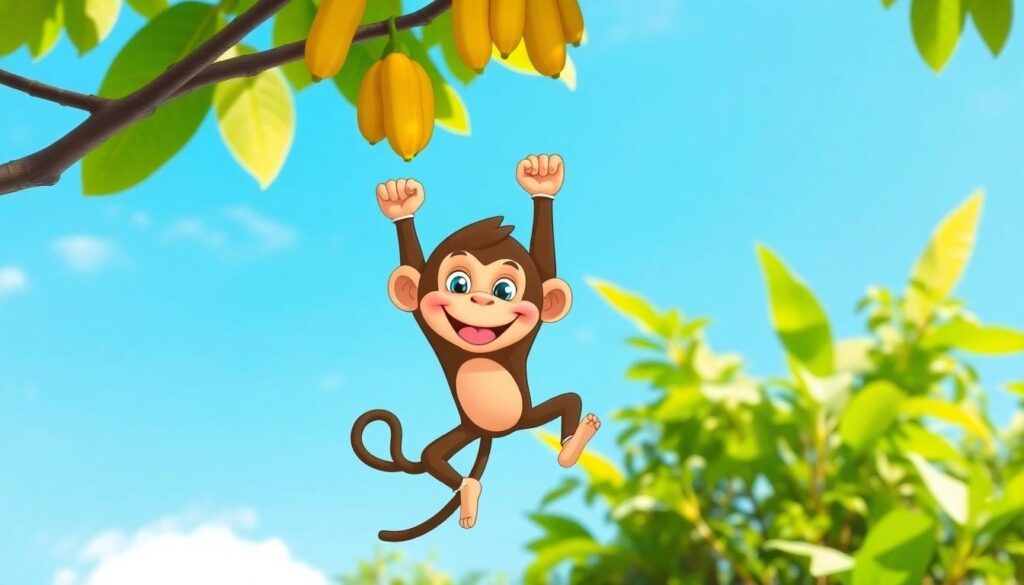Are you going bananas trying to find the perfect monkey puns to swing into your conversations? We’ve gathered the most a-peeling wordplay that’ll have everyone in your social circle howling with laughter.
From chimpanzee chuckles to gorilla giggles, monkey-themed humor never goes out of style. Whether you’re looking to spice up your social media posts, entertain kids at a zoo trip, or just want to monkey around with words, our collection of primate puns will definitely hit the spot. They’re the perfect way to break the ice and show off your wild sense of humor.
10 Banana-Slipping Monkey Puns That Will Have You Howling
- Why did the monkey fall out of the tree? Because it was dead! Just kidding—it couldn’t stop reading these a-peeling banana jokes! We guarantee this classic misdirection will leave your friends groaning.
- What’s a monkey’s favorite cookie? Chocolate chimp! This pun works perfectly at parties where you need to break the ice with some sweet humor.
- How do monkeys get down from trees? They trunk slide! This playful wordplay combines their natural habitat with a fun twist that kids especially love.
- What do you call a monkey who sells potato chips? A chimp off the old block! Combining familiar phrases with monkey terminology creates unexpected laughs.
- Where do monkeys go for drinks? The monkey bars! We’ve found this pun works well in social settings when everyone needs a good laugh.
- What’s a monkey’s favorite movie? Planet of the Apes-olutely Fabulous! This film-inspired pun showcases your knowledge of pop culture while delivering a chuckle.
- Why don’t monkeys play cards in the jungle? Too many cheetahs! The misdirection in this joke plays on animal expectations for maximum humor impact.
- What do you call a monkey with a banana in each ear? Anything you want—he can’t hear you! This visual gag lands well when told with animated gestures.
- How does a monkey feel after swinging through trees all day? Totally vine! This pun uses clever wordplay that connects to a monkey’s natural behaviors.
- What did the monkey say when he cut off his tail? It won’t be long now! We’ve saved this somewhat dark but hilarious pun for last because it always leaves people howling with laughter.
Why Monkey Puns Are Always a Barrel of Laughs

The Universal Appeal of Primate Humor
Monkey puns possess a universal charm that resonates with people across all age groups. Their simplicity makes them instantly accessible, requiring no specialized knowledge to appreciate the humor. Everyone understands phrases like “Let’s go bananas together!” or “You make me go ape with happiness!” because they tap into commonly known monkey behaviors and characteristics. These puns work so effectively because they combine familiar concepts with unexpected wordplay, creating moments of surprise that trigger laughter. Children giggle at the silliness while adults appreciate the cleverness behind expressions that transform everyday conversations into playful exchanges.
How Monkey Puns Break the Ice at Parties
Monkey puns serve as perfect conversation starters at social gatherings where breaking initial awkwardness is crucial. Using lines like “Quit monkeying around!” or “You’re the top banana!” instantly lightens the atmosphere, making people feel more comfortable and receptive to interaction. These lighthearted jokes create a shared moment of amusement that can bridge gaps between strangers and establish common ground. Party environments benefit particularly from monkey puns because they’re inoffensive yet entertaining enough to generate genuine laughs. We’ve found that even the simplest monkey-themed wordplay can transform a stiff gathering into an captivating social experience where people feel more relaxed and willing to open up.
Monkey See, Monkey Do: Wordplay That Swings from the Trees

Simian Similies That Will Make You Go Ape
We’ve compiled some of the most hilarious simian similes that leverage the playful nature of our primate friends. These comparisons use phonetic similarity to create instant laughs in any conversation. “You’re as curious as a monkey with a new toy” perfectly captures someone’s inquisitive nature while adding a touch of mischief. Many people love using “as agile as a tree-swinging gibbon” when describing someone with impressive athletic abilities. Feeling energetic today? Try saying you’re “bouncing around like a monkey on a sugar rush” to get some chuckles from friends. These similes work because they combine familiar monkey behaviors with everyday situations, creating visual imagery that’s both relatable and amusing. Next time you need to spice up your language, swing in with one of these top banana comparisons!
Going Bananas: Fruit-Based Monkey Humor That Never Gets Old

Peel-Your-Face-Off Funny Banana References
Banana jokes are absolutely central to monkey humor, creating some of the most memorable primate puns around. “You’re totally a-peeling!” ranks among the most popular banana-themed quips that never fail to generate smiles. Many comedic gems feature this yellow fruit as the star, like “Why do monkeys love bananas? Because they’re a-peeling!” – a classic that combines our simian friends with their favorite snack. Culinary humor gets the monkey treatment too, with lines such as “I asked the monkey how he liked his bananas, and he said they were ape-solutely delicious.” Birthday parties become extra festive when someone mentions that “everyone enjoyed the banana bread—it was quite ape-pealing.” These fruity references work so well because they connect directly to what we all know about monkeys – their famous love for this curved yellow fruit.
Tropical Fruit Puns for Monkey Business
Monkeys bring their jungle expertise to a whole array of tropical fruit jokes beyond just bananas. “The monkey’s favorite breakfast? A bunch of bananas!” showcases how simple food references create instant laughs when connected to primate dining habits. Fruit-based wordplay thrives on the natural connection between monkeys and their tropical habitat, turning ordinary situations into comedy gold. Professional monkey characters emerge in these jokes too, with scenarios like “The monkey mechanic said fixing the car would be a piece of jungle cake.” Creative storytelling shines through when monkeys enter human scenarios, especially when fruit references tie everything together. Phrases like “top banana” have become enduring catchphrases that instantly evoke monkey imagery while celebrating achievement. These tropical fruit connections work effectively because they tap into widely recognized monkey behaviors while adding a surprising twist that triggers our sense of humor.
Primate Professions: Monkey Puns for Every Occupation

From Monk-ey Business to Corporate Jungle
The workplace becomes infinitely more entertaining when you add a touch of primate humor to professional settings. “Monkey Business” perfectly captures those playful office antics that break up the monotony of corporate life. Many office environments resemble a “Corporate Jungle” where employees navigate the competitive industry much like primates swinging through dense foliage. For those with mechanical aptitude, being called a “Monkey Mechanic” highlights both skill and quick-witted problem-solving abilities that resemble a monkey’s nimble nature. Networking events become more enjoyable when you encounter a “Mingle-Ape” – that colleague who effortlessly works the room, connecting people with the social dexterity of our primate cousins.
When Monkeys Take Over the Workplace
Office environments transform dramatically when primate puns become part of daily conversation. We’ve all witnessed colleagues “Going Ape” with excitement over landing a major client or facing unexpected challenges. Teams caught “Monkeying Around” might be taking a much-needed break from serious work to boost morale and creativity. Exceptional work deserves recognition with an “Ape-solutely Fabulous” commendation that acknowledges outstanding contributions with playful flair. Every workplace benefits from having a “Monkey Manager” who demonstrates remarkable agility in handling complex problems and guiding teams through challenging projects. Creative professionals might identify as “Chimp-sicians,” blending artistic talent with technical precision in their work. The office “Monkey Comedian” keeps spirits high with well-timed humor during stressful periods, while those engaged in “Chitter-Chatter” around the water cooler spread information faster than monkeys swinging through trees.
Monkey Puns That Work for Every Age Group

Kid-Friendly Monkey Jokes
Children love simple, playful monkey jokes that incorporate familiar elements like bananas and playful behavior. “What’s a monkey’s favorite game? Banana tag!” offers the perfect blend of silliness and simplicity that kids instantly connect with. Young ones also giggle at questions like “Why don’t monkeys play hide and seek?” with the answer “They always monkey around and give themselves away!” Playing with recognizable phrases makes these jokes accessible and entertaining. “How do you make a monkey laugh? Tell a banana joke!” works wonderfully as both a joke and meta-commentary on monkey humor itself. Kids particularly enjoy food-related humor such as “What’s a monkey’s favorite breakfast? A bunch of bananas!” Friendly phrases like “Let’s go bananas together!” or “You’re the peanut to my banana!” give children easy-to-remember expressions they can share with friends.
Sophisticated Simian Wordplay for Adults
Adults appreciate more nuanced monkey humor that incorporates cultural references and clever wordplay. Proverb-inspired puns like “A monkey in the hand is worth two in the bush” or “All work and no play makes Jack a dull chimp” offer intellectual satisfaction through their literary twists. Cultural references elevate ordinary jokes, as seen in “The monkey’s paw is mightier than the sword” which cleverly combines a famous short story with a classic saying. Financial professionals might chuckle at “Monkey Funds” while those with religious humor could appreciate “Monkey Nuns.” Expressions such as “Feeling ape-ish today” or referring to someone as “the top banana” provide subtle ways to incorporate simian humor into everyday conversation. These sophisticated puns maintain the playful essence of monkey humor while adding layers of meaning that adults can unpack and enjoy.
How to Craft Your Own Monkey Puns

Creating your own monkey puns is easier than swinging from vine to vine. With just a few techniques, you’ll be generating primate wordplay that will have everyone going bananas.
Basic Formula for Creating Primate Humor
Mastering monkey puns starts with understanding the core structure of primate wordplay. Begin by identifying monkey-related vocabulary including terms about primates (ape, chimp), behaviors (swing, climb), and associated items (banana, jungle). Try phrases like “You’re the top banana!” or “Let’s make like a monkey and hang out!” to get started.
Playing with phonetics creates instant humor through homophones or rhymes. Pair words like “ape” with “grape” or “monkey” with “funky” for effortless wordplay. We’ve found that transforming common expressions works wonderfully too – “Monkeys don’t worry about Mondays; they call them Funky Days.”
The most effective monkey puns often follow predictable patterns. Replace standard words in phrases with monkey terms (turning “business” into “monkey business”). Create rhyming punchlines like “Why did the monkey go to school? To improve his ape-titude.” Highlight behavioral jokes that showcase typical monkey actions: “Monkeys love rock climbing; they’re never apes-tounded by new heights.”
Turning Everyday Phrases Into Monkey Business
Everyday phrases become hilarious when infused with monkey terminology. Food humor works exceptionally well with banana references: “Monkeys love bananas because they’re a-peeling.” This simple substitution of “appealing” transforms an ordinary comment into a delightful pun.
Career-based twists offer fertile ground for creative monkey wordplay. Consider how “The monkey chef specializes in banana splits and chim-pansies” cleverly substitutes “chrysanthemums” with a primate-inspired alternative. Emotional expressions gain extra impact through monkey terminology – “You make me go ape with happiness!” effectively replaces “wild” with “ape” to emphasize excitement.
Monkey Puns in Popular Culture

Monkey puns have cemented their place in mainstream entertainment, appearing across various media formats and delighting audiences of all ages. These clever wordplays showcase our ongoing fascination with our primate cousins while adding humor to familiar stories and characters.
Famous Movies and TV Shows with Primate Wordplay
The “Madagascar” series stands out as a prime example of primate-themed humor in animation, featuring King Julien, a lemur with distinctly monkey-like antics that entertain viewers throughout the franchise. While the “Planet of the Apes” series takes a more serious tone overall, several adaptations incorporate subtle primate references that add depth to the storytelling. “The Jungle Book” brings monkey characters to life with comedic elements that have become iconic parts of both animated and live-action versions. These productions demonstrate how monkey-related humor continues to engage audiences across generations, proving the enduring appeal of primate wordplay in visual media.
Celebrity Monkeys and Their Punny Names
Celebrity primates in entertainment often become platforms for creative wordplay, though explicitly punny names aren’t always used. Bubbles the Chimp, famously owned by Michael Jackson, didn’t have a punny name but frequently inspired wordplay in media coverage about his lifestyle. When featuring animal performers, media outlets commonly incorporate primate-related humor to capture audience attention and create memorable headlines. TV shows and commercials with monkey performers frequently use phrases like “monkeying around” or “going bananas” to describe their antics, reinforcing these common expressions in our cultural vocabulary. The relationship between celebrities and their primate companions provides fertile ground for pun creators who blend human fame with animal behavior for comedic effect.
The Science Behind Why Monkey Puns Make Us Laugh

Monkey puns captivate our sense of humor through their clever linguistic playfulness. These primate-themed jokes work by exploiting multiple meanings of words or sounds, creating amusement through their unexpected twists and familiar references.
Evolutionary Humor: Why Primates Tickle Our Funny Bone
Evolutionary psychologists have found compelling evidence that our appreciation for monkey humor has deep biological roots. Laughter and humor likely evolved from play vocalizations common among primates, creating an inherent connection between humans and our distant relatives. Apes and monkeys demonstrate behaviors remarkably similar to our sense of humor, particularly enjoying play and even showing appreciation for slapstick comedy—much like how we might chuckle at someone slipping on a banana peel. This evolutionary link helps explain why jokes involving monkeys and other primates resonate so strongly with human audiences. Our shared evolutionary history creates an unconscious bond that makes monkey-themed humor feel both familiar and inherently amusing.
The Psychology of Animal-Based Comedy
Animal-based comedy, particularly monkey puns, succeeds by combining cultural familiarity with cognitive playfulness. We’re naturally drawn to humor that involves monkeys because of our tendency to anthropomorphize these animals, attributing human characteristics to their behaviors and expressions. Monkey wordplay leverages this cognitive process, creating a perfect blend of creativity and relatability that appeals to our brains. The humor works on multiple levels: the clever linguistic tricks engage our intellectual side, while the familiar primate subjects trigger emotional connections. This combination makes monkey puns especially effective at capturing attention and generating laughter across different age groups and cultural backgrounds. Our brains find particular satisfaction in decoding the dual meanings present in monkey puns, creating that delightful “aha” moment when we understand the joke.
Going Ape: Our Top 5 All-Time Favorite Monkey Puns
Monkey puns have a unique way of bringing joy to our everyday conversations. From simple banana jokes that make kids giggle to clever workplace wordplay that lightens office tension we’ve seen how these simian sayings can transform social interactions.
Whether you’re breaking the ice at parties sharing laughs on social media or entertaining children these puns showcase your playful side while creating memorable moments of connection.
We hope this collection has inspired you to incorporate more monkey business into your humor arsenal. Remember the best puns often come unexpectedly so don’t be afraid to experiment with your own primate wordplay. Now go forth and let your humor swing from the highest branches!
Frequently Asked Questions
What makes monkey puns so universally appealing?
Monkey puns appeal to all ages because of their simplicity and accessibility. They tap into commonly known primate behaviors and characteristics that most people recognize. The element of surprise when combining monkey terminology with familiar phrases triggers laughter, while the playful nature of monkeys themselves adds to the humor. This universality makes monkey puns effective ice-breakers in various social situations.
How can I use monkey puns to break the ice at social gatherings?
Use monkey puns as conversation starters by casually dropping them into discussions. Lines like “Let’s go bananas together!” or “Quit monkeying around!” create instant shared amusement. These light-hearted jokes help transform stiff gatherings into more relaxed environments where people feel comfortable connecting. The familiar nature of monkey behavior makes these puns accessible even to people who don’t know each other well.
What are some banana-themed monkey puns I can try?
Popular banana-themed monkey puns include “Why do monkeys love bananas? Because they’re a-peeling!” and “The monkey’s favorite breakfast? A bunch of bananas!” For a workplace setting, try “This project is driving me bananas!” or “You’re totally a-peeling!” These fruit-based jokes connect naturally with monkey themes and are easily remembered for future use.
How do monkey puns differ for children versus adults?
Children enjoy simple, playful monkey jokes like “What’s a monkey’s favorite game? Banana tag!” that are straightforward and often food-related. Adults appreciate more sophisticated monkey humor with cultural references and clever wordplay such as “A monkey in the hand is worth two in the bush” or “Feeling ape-ish today.” Both age groups connect with the playful essence, but at different complexity levels.
Can monkey puns be appropriate in professional settings?
Yes, when used tastefully. Concepts like “Monkey Business” can lighten professional environments and boost morale. Terms such as “Corporate Jungle” or complimenting exceptional work as “Ape-solutely Fabulous” add humor without undermining professionalism. These puns can help relieve workplace tension and foster team bonding, though they should be used appropriately for your specific work culture.
How can I create my own monkey puns?
Start by identifying monkey-related vocabulary (ape, chimp, monkey, banana, swing, etc.) and play with phonetics. Pair words like “ape” with similar-sounding words like “grape” to create “grape expectations.” Transform everyday phrases into monkey-themed jokes by substituting key words. Use food humor or career-based twists for added creativity. The basic formula is finding words that sound like monkey terms and creating unexpected connections.
Why do we find monkey jokes funny from a scientific perspective?
Scientifically, monkey puns work because they exploit multiple meanings of words or sounds, creating cognitive surprise. Our appreciation for primate humor has evolutionary roots, as laughter evolved from play vocalizations common among primates. Our tendency to anthropomorphize monkeys enhances their relatability in jokes. This combination of linguistic playfulness and evolutionary connection makes monkey humor particularly engaging.
What are some examples of monkey puns in popular culture?
Monkey puns appear throughout entertainment media, including the “Madagascar” series with its memorable primate characters and “The Jungle Book” with King Louie. Celebrity monkeys often have punny names in headlines, and advertising frequently uses monkey wordplay to capture attention. Social media content featuring monkeys typically includes puns in captions, showing how deeply monkey humor is embedded in our cultural consciousness.
What makes a monkey simile effective in conversation?
Effective monkey similes like “as curious as a monkey with a new toy” or “as agile as a tree-swinging gibbon” work because they combine recognizable monkey behaviors with everyday situations. They create immediate mental images that people can relate to. These comparisons generate humor through familiar primate characteristics while adding colorful descriptions to your conversations. The best similes highlight specific monkey traits everyone understands.
How can monkey puns help with children’s language development?
Monkey puns introduce children to linguistic concepts like homonyms, word associations, and figurative language in an engaging way. The humor motivates children to remember and repeat these wordplays, reinforcing language patterns. Simple puns like “Why don’t monkeys play hide and seek? They always monkey around!” help children recognize double meanings while keeping them entertained, making language learning a playful experience.







